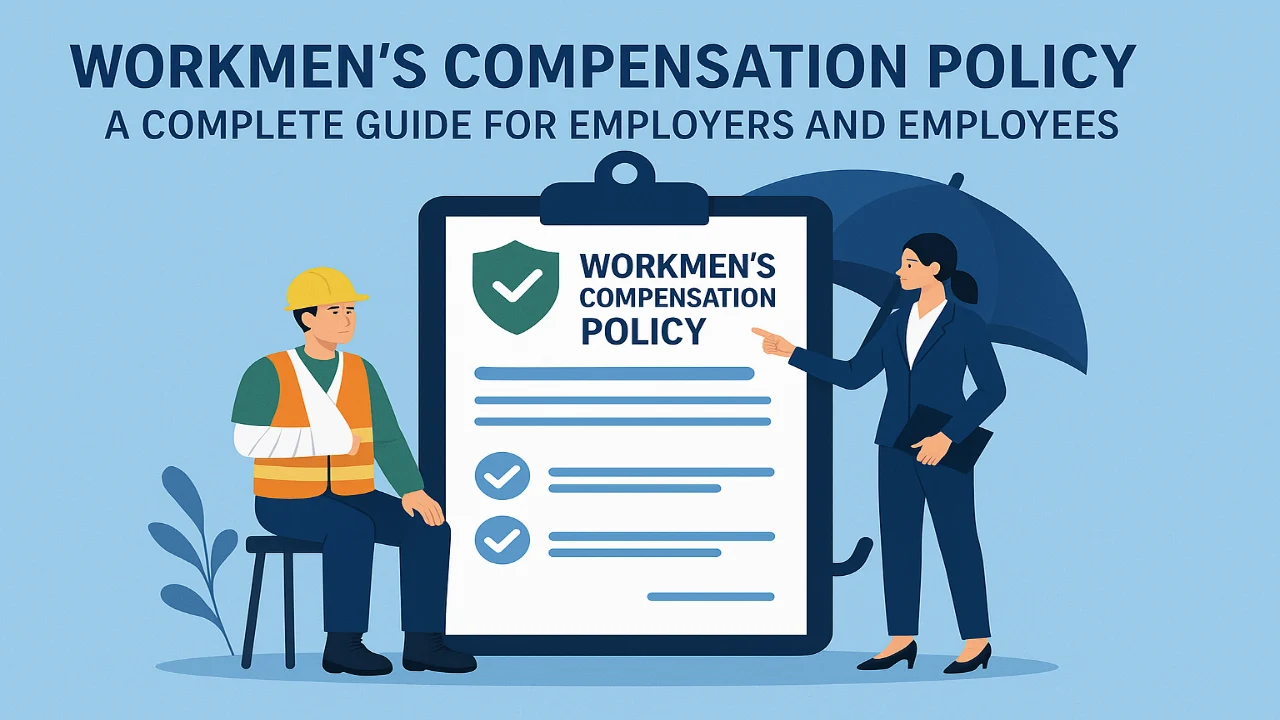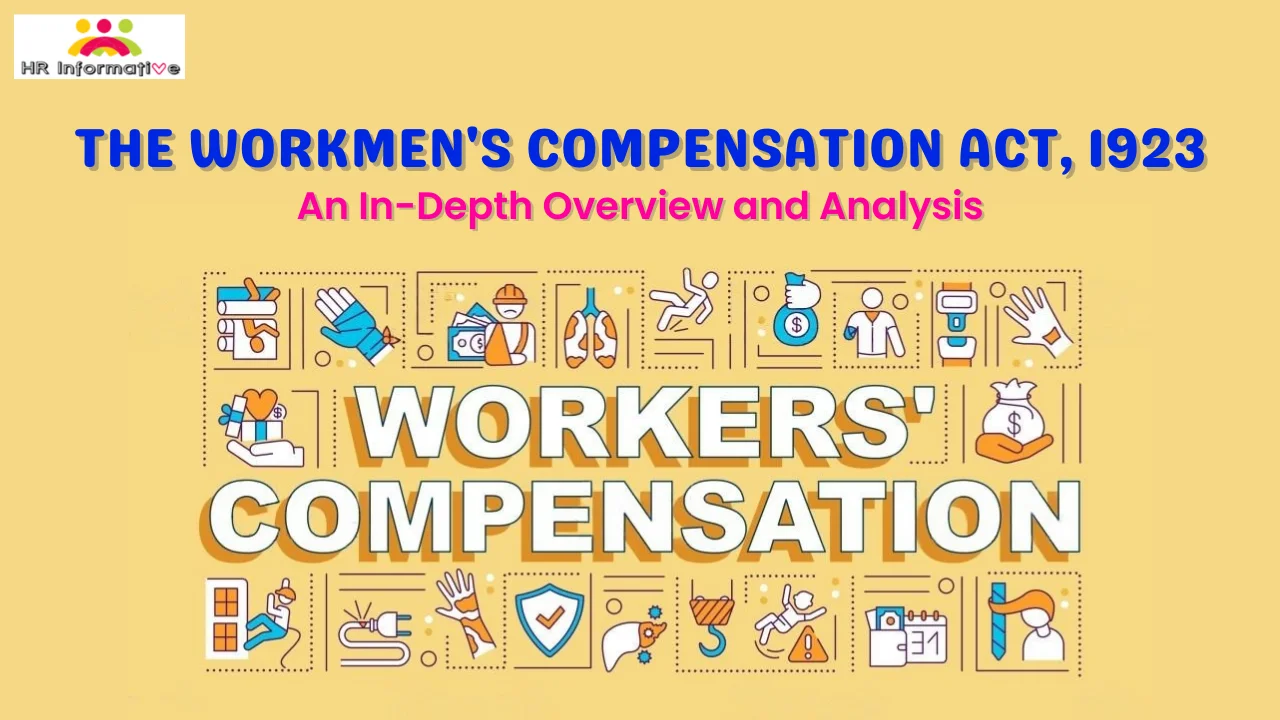Workplace accidents and occupational diseases can impact the lives of employees and the operations of businesses. To protect both parties, the Workmen’s Compensation Policy plays a vital role. This policy ensures that employees receive financial compensation in case of injury, disability, or death caused due to employment-related risks. At the same time, it safeguards employers from significant financial liabilities.
This article provides a complete overview of the Workmen’s Compensation Policy, its features, coverage, benefits, exclusions, and legal framework in India.
What is a Workmen’s Compensation Policy?
The Workmen’s Compensation Policy is an insurance policy that provides coverage to employers for their statutory liability under the Employee’s Compensation Act, 1923 (earlier known as the Workmen’s Compensation Act) for injury, disability, or death of an employee arising out of and in the course of employment.
It helps the employer pay compensation to the affected employee or their family, as mandated by law, without suffering financial strain.
Legal Framework: Employees’ Compensation Act, 1923
The policy derives its legal basis from the Employees’ Compensation Act, 1923. This Act makes it mandatory for employers to compensate employees (or their dependents) in case of:
- Injury caused by accidents at work
- Occupational diseases arising out of employment
- Death due to workplace hazards
The Act applies to both organised and unorganised sectors and covers employees who are not eligible for coverage under the Employees’ State Insurance (ESI) Scheme.
Who is a ‘Workman’ or ‘Employee’?
As per the Act, a workman or employee means any person engaged for wages (directly or indirectly) in:
- Manufacturing or industrial work
- Construction, mining, or transportation
- Factories or workshops
- Domestic or office work under specific conditions
However, workers covered under the Employees’ State Insurance Act (ESI Act) are usually excluded from this policy, unless directed otherwise.
Key Features of Workmen’s Compensation Policy
| Feature | Description |
|---|---|
| Statutory Coverage | Covers liability under the Employees’ Compensation Act, 1923 |
| Accidents and Diseases | Covers death, injury, or disability due to accident or occupational disease |
| Legal Cost Coverage | Legal expenses incurred with insurer’s consent are covered |
| Customization | Policy can be extended to include additional benefits |
| Premium Basis | Depends on number of employees, nature of work, and wages |
Coverage and Benefits
Covered Risks
- Death due to workplace accident
- Permanent total disability
- Permanent partial disability
- Temporary total disability
- Occupational diseases
Compensation Benefits
| Type of Injury / Event | Compensation Payable |
|---|---|
| Death | 50% of monthly wages × relevant factor (age-wise) or ₹1,20,000 (whichever is higher) |
| Permanent Total Disability | 60% of monthly wages × relevant factor or ₹1,40,000 (whichever is higher) |
| Permanent Partial Disability | Proportionate amount based on loss of earning capacity |
| Temporary Total Disability | Half-monthly payments equal to 25% of monthly wages for the period of disablement |
| Medical Expenses | Optional extension, if purchased |
Note: The “relevant factor” is based on the employee’s age as per Schedule IV of the Act.
Legal Liability
- Legal costs and court awards are covered if insurer gives prior consent.
What is Not Covered? (Exclusions)
- Injuries not arising out of employment
- Accidents under the influence of drugs/alcohol
- Injuries due to intentional self-harm or misconduct
- Employees not on the payroll (in some cases)
- Covered under ESI (unless the policy extends coverage)
- War, terrorism, or nuclear risks (unless specially covered)
Importance for Employers
- Statutory Compliance – Ensures compliance with the Employees’ Compensation Act
- Risk Management – Protects against unforeseen workplace incidents
- Financial Security – Avoids large out-of-pocket settlements
- Legal Support – Helps deal with compensation claims and legal suits
Importance for Employees
- Income Security – Assures compensation in case of injury or death
- Family Protection – Dependents receive financial support in case of fatal accidents
- Medical Relief – Some policies may include treatment expenses
- Peace of Mind – Creates a sense of safety at the workplace
How to Buy Workmen’s Compensation Insurance?
Employers can purchase this policy from various general insurance companies in India, such as:
- New India Assurance
- Oriental Insurance
- United India Insurance
- ICICI Lombard
- Tata AIG
- Bajaj Allianz
- HDFC ERGO
Documents Required:
- Details of business activities
- Number of employees and wage details
- Past claim history (if any)
- Risk exposure and workplace safety measures
Premium Calculation
The insurance premium is calculated based on:
- Number of employees
- Nature of work (risk classification)
- Total wages paid
- Add-on covers (e.g., medical expenses, occupational disease coverage)
How to Make a Claim
- Notify the Employer: The injured employee or family should inform the employer immediately.
- Medical Examination: A certified medical practitioner assesses the injury or disability.
- Claim Submission: Employer submits claim documents to the insurance provider.
- Investigation and Settlement: Insurer investigates and pays the compensation to the employee or dependents.
Documents Required for Claim
- Duly filled claim form
- Accident report
- Medical reports and certificates
- Wage details of the employee
- Death certificate (in case of fatality)
- Legal heir certificate (for dependents)
- FIR (if applicable)
Difference Between Workmen’s Compensation and ESI
| Criteria | Workmen’s Compensation Policy | Employees’ State Insurance (ESI) |
|---|---|---|
| Coverage | Only accidents or diseases at work | Comprehensive health and social security |
| Contribution | Employer pays premium | Employer and employee contribute |
| Applicability | Non-ESI covered employees | Applies to workers earning below wage threshold |
| Benefits | Lump sum compensation | Includes medical, sickness, maternity, etc. |
Is It Mandatory?
Yes, for applicable employees not covered under ESI, the Employees’ Compensation Act makes it mandatory for employers to provide compensation in case of workplace injuries or death. To mitigate the financial risk, it is strongly advised (and often contractually required) to take a Workmen’s Compensation Insurance Policy.
Final Thoughts
The Workmen’s Compensation Policy is a crucial safety net that ensures financial protection for employees and legal compliance for employers. With workplace risks being an unavoidable part of many industries, especially construction, manufacturing, logistics, and more, this policy provides much-needed assurance and protection.
Employers must ensure that all eligible employees are covered under either ESI or a Workmen’s Compensation Policy, and employees should understand their rights to claim compensation in case of any unfortunate event.
Tip for Employers: Always keep the policy active, maintain updated wage and worker records, and provide a safe work environment to minimise liabilities and build trust with your workforce.
Frequently Asked Questions (FAQs)
Q1. Is Workmen’s Compensation Policy mandatory in India?
Yes, it is mandatory for employers under the Employees’ Compensation Act for employees not covered by ESI.
Q2. Can contract workers be covered under this policy?
Yes, contractors or principal employers can take a policy to cover contract workers.
Q3. What if an employee is injured outside the workplace?
The policy covers only injuries arising “out of and in the course of employment.” Accidents during work-related travel may be considered if justified.
Q4. How is the compensation amount calculated?
It is calculated based on wages, age, and extent of disability as per the formula in the Act.
Q5. Is medical expense reimbursement included?
Only if the policy includes a medical extension; otherwise, it is not covered.
Explore More Related Posts :
- Understanding Subsistence Allowance in India: A Comprehensive Guide
- Contributing to EPF After 60 Years: Understanding the Rules and Exploring Alternatives
- Voluntary Provident Fund (VPF), Features, Benefits, Eligibility, Contribution, Process to Open
- Sexual Harassment of Women at Workplace (Prevention, Prohibition, and Redressal) Act, 2013



![Contract Labour (Regulation & Abolition) Act, 1970 – Meaning, Applicability, Registration & Compliance Explained [2025 Guide] 4 Contract Labour (Regulation & Abolition) Act, 1970 – Meaning, Applicability, Registration & Compliance Explained](https://hrinformative.com/wp-content/uploads/2025/07/Contract-Labour-Regulation-Abolition-Act-1970-–-Meaning-Applicability-Registration-Compliance-Explained.webp)